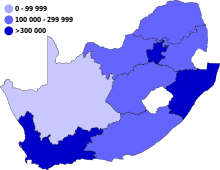COVID-19 pandemic in South Africa
The ongoing COVID-19 pandemic was confirmed by Minister of Health Zweli Mkhize to have spread to South Africa on 5 March 2020. The first known case was a South African returning from Italy.
| COVID-19 pandemic in South Africa | |
|---|---|
 Map with number of confirmed COVID-19 cases per province. | |
 Map with number of confirmed COVID-19 deaths per province. | |
| Disease | Coronavirus disease 2019 (COVID-19) |
| Virus strain | Severe acute respiratory syndrome coronavirus 2 (SARS-CoV-2) |
| Location | South Africa |
| First outbreak | Wuhan, Hubei, China 30°35′14″N 114°17′17″E / 30.58722°N 114.28806°E |
| Index case | Hilton, KwaZulu-Natal |
| Arrival date | 1 March 2020 (4 years, 4 months and 3 days ago) |
| Confirmed cases | 734175 (as of 6 November 2020[update])[1] |
| Recovered | 675593 (as of 6 November 2020[update])[1] |
Deaths | 19749 (as of 6 November 2020[update])[1] |
| Government website | |
| sacoronavirus | |
Response

On 15 March, the President of South Africa, Cyril Ramaphosa, declared a national state of disaster,[2] and announced measures like travel restrictions and the closure of schools from 18 March.
On 17 March, Ramaphosa formed the National Command Council on COVID-19,[3] "to lead the nation's plan to contain the spread and mitigate the negative impact of the coronavirus".[3][4]
The parliament of South Africa suspended all activities on 18 March.[5] Both the African National Congress and Democratic Alliance postponed their respective elective congresses.[6]
On 23 March, a national lockdown was announced, starting on 26 March 2020.[7] On 9 April, Ramaphosa announced that it would be extended until the end of April.[8]
On 21 April, a 500 billion rand stimulus was announced in response to the pandemic.[9]
On 23 April, Ramaphosa announced that the lockdown restrictions would slowly be phased out.[10] Level 4 started on 1 May. On 1 June, the country entered level 3.[11]
Minister of Co-operative Governance and Traditional Affairs, Nkosazana Dlamini-Zuma, extended the state of disaster on 3 June. It ended on 4 July.[12]
Testing

The National Institute for Communicable Diseases (NICD) started testing people in South Africa for SARS-CoV-2 on 28 January 2020.[13]
By the middle of March, state hospitals were offering free COVID-19 testing.[14]
On 11 June, the Health Department said that over 1 million tests had been completed.[15]
Numbers
As of 27 April 2020[update], the median age of people with laboratory-confirmed cases was 38 years, and as of 2 May 2020[update] the median age of patients who died was 64.
As of 12 July 2020[update], there were 276242 confirmed cases and 4079 confirmed deaths, as well as 134874 recoveries.[16]
As of 6 November 2020[update], there were 734175 confirmed cases and 19749 confirmed deaths, as well as 675593 recoveries.[17]